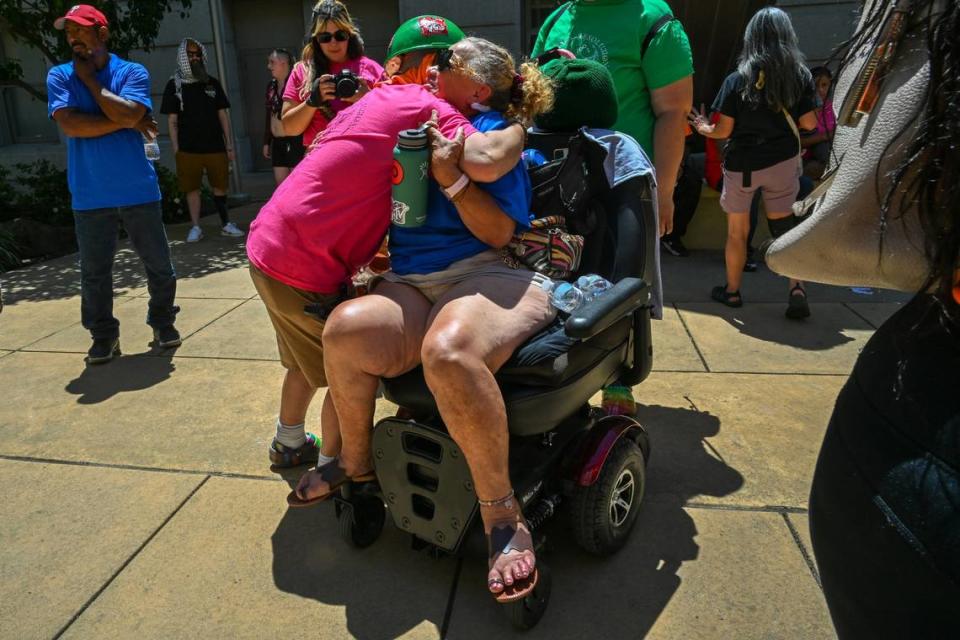Homeless activists sue city of Sacramento over plans to close tight-knit homeless camp
The city of Sacramento is now facing a lawsuit regarding its plans to close a tight-knit North Sacramento homeless camp where roughly 50 people live in city-issued trailers.
The Sacramento Homeless Union Wednesday filed a lawsuit in Sacramento Superior Court alleging the city is violating a lease by threatening to close Camp Resolution before moving all its residents into permanent housing. The union plans to follow it up by filing a request for a temporary restraining order that, if granted, would bar the city from clearing the camp until all residents are housed, said Anthony Prince, union attorney.
A group of about 50 homeless people and activists marched in the downtown Sacramento streets Wednesday in 90-degree heat to put pressure on the city. While holding banners that read “nothing about us without us,” they chanted, “What do we want? Housing! When do we want it? Now!”
Betty Edwards, 60, lives in Camp Resolution and uses an electric wheelchair to get around. She receives dialysis and last year underwent open heart surgery. She sat in her wheelchair outside City Hall Wednesday during a news conference.
“I cant afford rent,” said Edwards, 60, who grew up in Sacramento. “A studio apartment is $1,200 a month. I’m on Social Security. I can’t afford that. I was never offered an apartment. I have to get on the waiting list for Section 8 or something like that. I’m here and I’m waiting for someone to tell me what I can do next.”
Even if she gets a Section 8 voucher she faces an uphill battle. There are about 1,000 homeless people who have a Section 8 voucher who still can’t find a landlord to accept it, according to the Sacramento Housing and Redevelopment Agency.

Danyell Mayberry, 44, said she has also never been offered housing while living at Camp Resolution — only ID cards and bus passes. She became homeless after she lost her job and was evicted from her apartment, she said. Every time she tries to apply for a new apartment, she is denied due the eviction on her record, she said.
“We have a lease with the city,” said Mayberry, who grew up in West Sacramento. “They should do what they said they were going to do.”
Since 2022, the city has allowed roughly 50 residents of Camp Resolution in North Sacramento to live on a city lot and gave them trailers to live in. But when some people were camping in tents on the dirt, which is against the lease for environmental reasons, the city announced plans to close the site by May 16.
Several residents went to the council in April to plead for the city not to close the camp, and the city then announced it would delay plans to close it.
Mayor Darrell Steinberg promised the city would offer all residents an indoor shelter bed before clearing them off the site.
“We will not displace you from Camp Resolution without some other alternatives that are safe, dignified and indoors,” Steinberg said during an April 30 council meeting.
Camp Resolution is unique because it’s self-governed, and the city does not have to pay costly contractors for operations. By contrast, the city’s 100-bed shelter at X Street and Alhambra costs the city about $10 million a year.
Since the camp opened, several tents have sprung up nearby, just outside the gate, along the bike trail, including some people who are among the 800 on the waiting list to live in Camp Resolution.
The city in 2022 signed a variance with the Central Valley Regional Water Board that allowed people to camp in trailers on the site, but prohibited them to camp in tents, due to vapor contamination. The type of contamination that’s present is not harmful to people in vehicles because they’re raised off the ground, the water board said at the time. Some people lived in tents anyway, prompting District Attorney Thien Ho to threaten to sue the city, as he has in the past.
The state variance is expiring, and the city did not ask for an extension.
City spokesman Tim Swanson said the city has offered a new location for the Camp Resolution residents to move their trailers to. He declined to provide the address.
“Unfortunately, the Sacramento Homeless Union has not been open to the city’s repeated offers to collaborate and find solutions for the campers,” Swanson said in a statement. “The city cannot ignore the campers who consistently refuse to avoid tent camping on contaminated soil. Tent camping on contaminated soil is wrong, and the lessee of the site, Safe Ground Sacramento, the organizers of the site, the Sacramento Homeless Union, and the campers know it.”
Nobody is living in tents at the site anymore, said Joyce Williams, one of the camp’s leaders.
The homeless union has declined invitations to meet with the city until the city rescinds its March 28 letter that states the camp must close May 16, the lawsuit states. That letter is “hanging over the heads of the residents like an intimidating Sword of Damocles, making impossible any genuine, good-faith discussions that might otherwise prove productive,” the lawsuit states.
Most of the residents are over 45 and all of them have at least one chronic medical illness, said Crystal Sanchez of the Sacramento Homeless Union. All but four have a documented disability.
The lawsuit names the city, Steinberg, Ho, City Manager Howard Chan, and two assistant city managers as defendants.
Ho’s spokeswoman Shelly Orio did not immediately respond to messages seeking comment on the new lawsuit.
A court date has been set for May 16, 2025.

